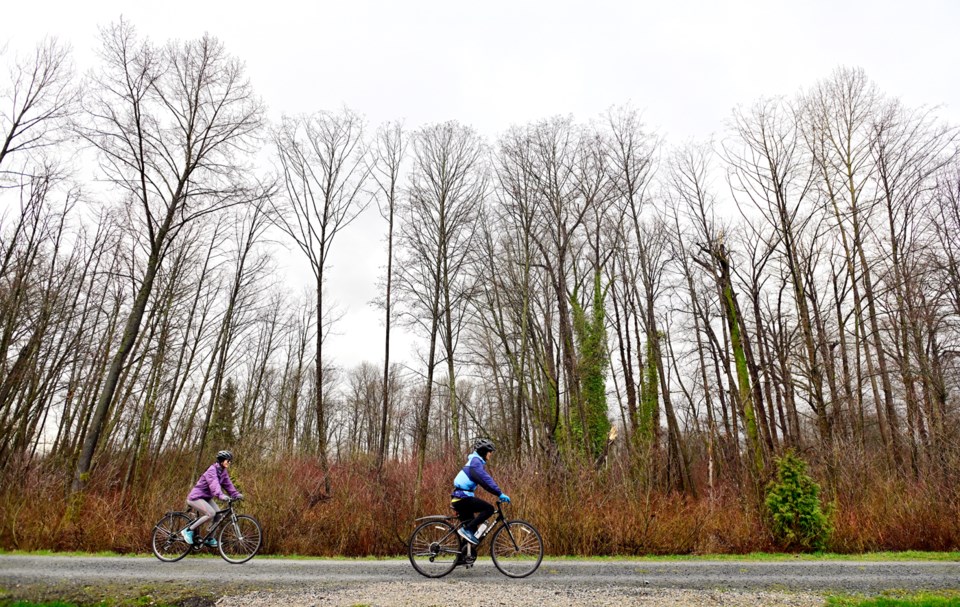The battle over the location of Burnaby’s Green Recycling and Organics (GRO) facility has been framed as a choice between climate progress and habitat preservation, when in fact its ability to advance climate progress is weak at best.
The proposed facility will result in the loss of 21-acres of dedicated parkland, including eight acres of sensitive wetland habitat. Fraser Foreshore Park ― selected as the GRO facility’s potential site ― is a large parcel of undeveloped green space situated among a sea of warehouses. A city sign that greets visitors to the park describes it as containing “a diversity of habitat types which are becoming scarce in the Fraser River; mature cottonwood forest, river estuary, tidal lagoon, tidal meadow, and old field meadow.”
The proposed GRO facility site was also the recipient of a habitat restoration project in 2001, which was designed to compensate for habitat loss elsewhere, putting into question the usefulness of Burnaby’s plan to offset the loss of this habitat with restoration work of their own. The irony of planning to compensate for the destruction of habitat that was created through prior compensation is palpable.
What is incredible too, is that a facility being touted by the city as an “important step towards becoming a carbon neutral city” would in fact be designed to generate greenhouse gases. Referred to by many names ― “biogas,” “renewable natural gas” (RNG), “biomethane” ― the outcome is simple and troubling: the gas to be produced by the GRO facility is methane, a potent greenhouse gas with more than 80 times the warming power of CO2.
Unmentioned by proponents of the GRO project is that one of the foundational purposes of composting is to reduce the amount of methane generated when green waste goes to landfill. This is accomplished by keeping the decomposition process aerobic, as methane-producing microbes are not active when oxygen is present. The GRO facility on the other hand, will deliberately maintain an anaerobic environment in order to generate methane.
Gas companies have a well-documented infatuation with “renewable natural gas” and its ability to keep municipalities hooked on their climate-warming product. It is unsurprising then, that the city has entered into an offtake agreement with FortisBC to sell excess methane not sent to Burnaby’s gas lines.
By continuing to invest in new gas producing facilities, Burnaby is also supporting the maintenance of existing gas infrastructure well into the future, hindering the push to electrify other sectors and activities, including home heating, cooking and transportation.
At a time when the IPCC is stating that no new fossil fuel projects can be approved, camouflaging the methane-producing GRO facility as a step towards climate progress is deeply disturbing.
Un-dedicating parkland for this project demeans the original intent of park dedication, a powerful tool that municipalities have for land protection and habitat conservation. Dedicating parkland means a majority of residents consented to protecting a parcel of land in perpetuity, not until the mayor and council decide otherwise. And if we do decide to un-dedicate parkland, it must therefore be residents that make this decision, via a referendum.
Hidden in the staff report is a short mention of a future District Energy Utility facility situated on land adjacent to the GRO facility, indicating that more of Fraser Foreshore Park could be at stake.
Much like the disastrous Site C “clean energy project” and the push to mine the deep sea, the GRO facility represents a relatively new and dangerous trend of using climate change as rationale to push through ecologically destructive infrastructure projects. Until decision-makers realize that new fossil fuel projects are incompatible with slowing planetary warming, true climate progress can not be achieved.
Auston Chhor and Allison Dennert are scientists at Raincoast Conservation Foundation, a team of conservationists empowered by research to safeguard the lands, waters, and wildlife of coastal British Columbia.



